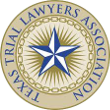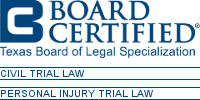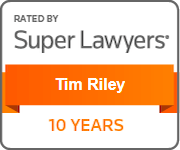ANN LENERT AND JOHN DWYRE, Appellants, v. STATE FARM LLOYDS INSURANCE COMPANY, ET AL., Appellees.
NUMBER 13-97-422-CV
COURT OF APPEALS OF TEXAS, THIRTEENTH DISTRICT, CORPUS CHRISTI
1999 Tex. App. LEXIS 6504
August 26, 1999, Delivered
August 26, 1999, Filed
NOTICE:
[*1] PURSUANT TO THE TEXAS RULES OF APPELLATE PROCEDURE, UNPUBLISHED OPINIONS SHALL NOT BE CITED AS AUTHORITY BY COUNSEL OR BY A COURT.
PRIOR HISTORY:
On appeal from the 133rd District Court of Harris County, Texas.
This Opinion Substituted on Denial of Rehearing for Withdrawn Opinion of June 10, 1999, Previously Reported at: 1999 Tex. App. LEXIS 4366.
DISPOSITION:
Reversed and remanded for trial on the merits between Ann Lenert and State Farm Lloyds Insurance Company. Judgment Affirmed in favor of Dale S. Trimble against Ann Lenert and attorney, John S. Dwyre.
COUNSEL:
AMICUS CURIAE: Mark L. Kincaid, Attorney at Law, Philip K. Maxwell, Joe K. Longley, Longley & Maxwell, Attorneys at Law, Austin, TX.
FOR APPELLANT: C. Charles Dippel, Law Office of Charles Dippel, Mark L. Aschermann, Attorney at Law, Houston, Tx.
FOR APPELLEE: Timothy D. Riley, Riley & Harris, Warren R. Taylor, Taylor & Taylor, Patrick O’Briant, Attorney at Law, Houston, TX.
JUDGES:
Before Justices Dorsey, Hinojosa, and Kennedy. n1 Opinion by Retired Justice Kennedy.
n1 Retired Justice Noah Kennedy assigned to this Court by the Chief Justice of the Supreme Court of Texas pursuant to TEX. GOV’T CODE ANN. § 74.003 (Vernon 1988).
OPINIONBY:
NOAH KENNEDY
OPINION:
OPINION ON MOTION FOR REHEARING
Opinion by Retired Justice Kennedy
We withdraw the opinion previously entered and substitute this opinion in its place.
Appellant, Ann Lenert (Lenert), was the holder of a fire insurance policy with appellee, State Farm Lloyds Insurance (State Farm). Appellee, Dale S. Trimble (Trimble), [*2] was a lawyer for State Farm who was named as a defendant by appellant for conducting the “examination under oath” provided for in appellant’s policy.
A fire occurred at appellant’s home which resulted in extensive damage to the house and its contents. She submitted a claim to State Farm. State Farm’s investigation of the fire resulted in their conclusion that the fire was the result of arson. Because, by Lenert’s own testimony, she was the sole occupant of the house when the fire started and, further, that the house was locked from the inside, State Farm concluded that Lenert had set the fire. They refused recovery on the policy which resulted in her filing the lawsuit which is the basis of this appeal. The case was rancorous from the outset. n2 During its course, plaintiff’s attorney amended his pleadings to include State Farm’s attorney, Trimble, as a defendant. He also filed motions to recuse two judges involved in the trial, one of which motions was apparently filed because the judge denied him a continuance.
n2 Examples of appellant’s attorney’s conduct include:
After a hearing that went late into the night, when the judge retired from the bench, appellant’s attorney followed the judge toward his chambers and insisted on a ruling.
On one occasion the attorney asked what reason the court had for calling a recess.
When the court was attempting to clarify something the judge had said, the attorney interrupted to say, “Your honor, I object to this court asking questions on cross-examination to try and protect itself.”
Also:
“What I’m trying to do is demonstrate that I need a record of everything that this court says because there’s (sic) many things that have been said and changed off the record.”
And further:
“And this is just another thing in a pattern, Your Honor, of many things that are clearly intended to, for some reason or another, assist, procedural or otherwise, the insurance companies in this case.”
Also:
“You know, the court smiled at this thing. I do not find it humorous.”
Also:
“This court should have granted the first motion for continuance. It did not. Now the court is trying to have its cake and eat it too,”
Also:
“If you’re going to lecture me, Your Honor, that’s improper.”
[*3]
The result of the bench trial in the trial court was the trial judge terminated the trial following appellant’s having rested, and after State Farm had presented evidence from a rebuttal witness (an arson investigator), but before appellant had concluded his cross-examination of the rebuttal witness. The judge also excused the witness being examined to return to his home in a distant city. She first offered to resume the trial the afternoon of the following day but appellant’s attorney protested. n3 She then terminated the trial. Appellees filed a bill of exceptions showing what evidence they would have offered had the trial continued, however, in view of the court’s favorable ruling, they do not complain here of the termination of the trial.
n3 The trial judge had cautioned the parties from the beginning that she was scheduled to pick a jury in an asbestos case on a certain date, which turned out to be the day after she terminated the bench trial which is the subject of this appeal.
The record shows that appellant [*4] had designated no rebuttal witnesses. The trial judge later filed findings of fact and conclusions of law favoring appellees.
Appellant raises four issues in this appeal. Appellee, State Farm, brings one cross-point.
Appellant’s first issue is: “Did the trial court deny Lenert due process by prematurely terminating the bench trial on the merits of her case against Lloyds before all the evidence was presented, excusing a witness under cross-examination, and finding against her?” We hold that it did.
The issue boils down to this. There is no dispute that a fire occurred. Nor is there a dispute that appellant had a policy of insurance with appellee, State Farm. The burden of proving that appellant deliberately started the fire is upon State Farm. After appellant had rested its case, State Farm began to meet its burden of showing that appellant started the fire by presenting an expert witness on this point. When the witness was passed to appellant’s attorney, cross-examination began. The judge, which the record shows was overly patient with appellant’s attorney, interrupted the cross-examination and terminated the trial. The judge subsequently made a finding of fact that, “plaintiff, [*5] Ann Lenert, intentionally set the fire at her home on April 29, 1995.” She also drew conclusions of law, the first three of which are as follows:
1. The policy of insurance issued by State Farm Lloyds to Ann Lenert is void as a result of plaintiff Ann Lenert’s intentional act of setting the fire to her home.
2. No benefits are due and owing by State Farm Lloyds to plaintiff Ann Lenert.
3. Public policy of the state of Texas bans any recovery by Ann Lenert.
Summary judgment was entered for appellees.
We concede the validity of the authority cited in State Farm’s brief to the effect that:
The trial court…may properly intervene to expedite the trial and prevent any unnecessary waste of time.” Food Source, Inc. v. Zurich Ins. Co., 751 S.W.2d 596, 600 (Tex. App.–Dallas 1988, writ ref’d.)
An appellate court will not reverse a judgment for error relating to the trial judge’s exercise of discretion in the control of a trial unless probable prejudice is shown. Texas Employers’ Ins. Ass’n. v. Garza, 557 S.W.2d 843, 845 (Tex. App.–Corpus Christi 1997, writ ref’d.)
However, none of the above is authority for a trial court to terminate a case in [*6] the middle of cross-examination of a defendant’s key witness and grant judgment to defendant on a point on which the defendant has the burden of proof. This court has so held in King v. Lindley, 697 S.W.2d 749, 752 (Tex. App.–Corpus Christi 1985, writ ref’d) and Turcotte v. Trevino, 499 S.W.2d 705, 713, 723 (Tex. App.–Corpus Christi 1973, writ ref’d). We hold that the trial court erred in so doing and grant the relief sought in appellant’s first issue.
The foregoing does not mean, however, that we reverse the case in its entirety. Appellant’s argument in issue number two that the trial court erred in hearing and granting appellee Trimble’s motion for summary judgment is without merit. In granting the summary judgment, the court found that:
There was no actionable cause of action [against Trimble] arising out of the events made the basis of the lawsuit and that there is no basis in law and in fact.
It is a harassing lawsuit.
It certainly is a violation of rule 13, chapter 10 of the Practices and Remedies Code.
The highlights of appellant’s stated grounds for joining Trimble as a defendant are:
Instead of rejecting or accepting the claim [*7] on June 26, 1995, Tabor, as an agent or authorized representative of State Farm and Dale Trimble, announced that the firm of Trimble and Associates would “…conduct the examination under oath…”
Trimble is an attorney; he has no insurance claims adjuster’s license or other insurance license in the state of Texas.
State Farm and Trimble were not interested in the information an examination under oath could provide for a claims evaluation. Instead, defendants sought to compel medieval and draconian conditions which were unconscionable in all respects.
In addition, Trimble spoke as an agent and authorized representative of State Farm when he stated, “…State Farm Lloyds neither admits nor denies liability on your claim at this time…”
The examination under oath was scheduled for July 28, 1995. At the examination the draconian effects of defendants’ attempts to unreasonably and unconscionably intimidate plaintiff were apparent. The setting was a trial lawyers office with bright lights focused on plaintiff, a video camera, a microphone, voice mixing equipment, video background, etc.
The foregoing does not state a cause of action.
Appellant’s argument that Trimble offered no [*8] evidence of harassment fails because such is not required by either Rule 13 of the Texas Rules of Civil Procedure or by Chapter 10 of the Texas Civil Practices and Remedies Code. The judge was well within her discretion in the findings that she made in view of the patently absurd allegations directed toward Trimble in appellant’s pleadings. It was also within her discretion to take judicial notice of the proper attorney’s fees to be awarded by examining Trimble’s file. Chapter 38.004 of the Texas Civil Practices and Remedies Code authorizes the trial court to take judicial notice of the usual and customary attorney’s fees and of the contents of the case file without receiving further evidence in a proceeding before the court. See Matter of the Estate of Kidd, 812 S.W.2d 356, 358 (Tex. App.–Amarillo 1991, writ denied).
Appellant also argues that sufficient notice was not given of the hearing on the motion of Trimble for summary judgment. Rule 166a(c) of the Texas Rules of Civil Procedure requires a twenty-one day notice from the filing of a motion for summary judgment and service thereon before the time specified for hearing. The record here shows that the hearing [*9] was not held when originally scheduled, but was heard subsequently. Therefore, appellant had more than the requisite notice of the hearings. The twenty-one day notice requirement does not apply to a resetting of the motion provided the non-movant had twenty-one days notice. Brown v Capital Bank, N.A., 703 S.W.2d 231, 234 (Tex. App.–Houston [14th Dist.] 1985, writ ref’d.)
We overrule and deny the relief sought by appellant in her second issue. We also reject the argument of appellant in issue number three that the court awarded more attorney’s fees than was requested. The amount of attorney’s fees awarded as sanctions under Rules 13 and 215 n4 is solely within the discretion of the trial court. Glass v Glass, 826 S.W.2d 683, 688 (Tex. App.–Texarkana 1992, writ denied).
n4 Tex. R. Civ. P. Ann. 13 and 215 (Vernon 1999).
Appellant’s fourth issue alleging that the trial court abused its discretion in denying appellant’s motions for continuance is moot by virtue of our ruling [*10] on issue number one.
Appellee State Farm has filed a cross-point urging that, “even if the contract case is remanded, judgment on the extra-contractual claims should be affirmed.” We decline to rule on this cross-point in view of our remand of the case for trial on the merits.
We reverse and remand the case for trial on the merits between Ann Lenert and State Farm Lloyds Insurance Company. We AFFIRM the judgment in favor of Dale S. Trimble against Ann Lenert and attorney, John S. Dwyre. Costs are assessed one-half against State Farm Lloyds and one-half against Lenert and Dwyre.
Noah Kennedy
Retired Justice
Opinion delivered and filed this the 26th day of August, 1999.








